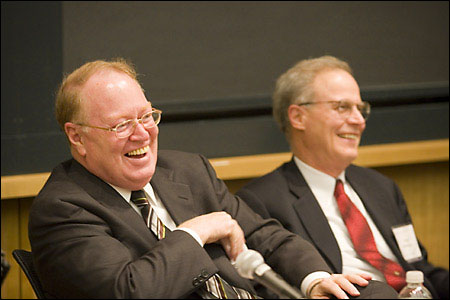Dramatic increase in undergrads seeing the wide world
Symposium underscores University’s commitment to international experience
Undergraduate education at Harvard has improved significantly in recent years. The reason? A growing number of students are spending time away from Harvard.
This paradoxical notion was the theme of a presentation May 12, “Insight and Initiative Abroad: A Harvard Symposium on International Experience.” The symposium was jointly sponsored by the Office of International Programs (OIP) and the David Rockefeller Center for Latin American Studies (DRCLAS).
“When I came to Harvard in 1993, study abroad was possible but not encouraged,” said DRCLAS Director John Coatsworth, the Monroe Gutman Professor of Latin American Affairs. “The attitude was, ‘You’re already at the greatest university in the world; why go anywhere else?’”

Students who wanted to study abroad had to fill out mountains of paperwork and obtain numerous signatures, Coatsworth said, and there were no internal programs to make the process smoother or easier.
The situation changed when Lawrence H. Summers became University president in 2001, bringing to the institution a commitment to strengthening Harvard’s engagement with the larger world on all levels. The appointment of William C. Kirby, Edith and Benjamin Geisinger Professor of History, as dean of the Faculty of Arts and Sciences reinforced that commitment, and finally, the establishment of the Office of International Programs in 2003 and the hiring of Jane Edwards as its director provided students with the structure and encouragement to realize their international aspirations.
“Now a whole new world of opportunity has opened to Harvard undergraduates,” Coatsworth said.
Edwards, who served as moderator of the discussion, said that last year, 933 undergraduates studied abroad. This year, her office is still counting, but the number is well over 1,100. She added that in recent years the College has approved proposals not only for academic projects, but for service activities and volunteer work as well.
“What’s important is that students should be abroad and engaged with society,” she said.
Jorge Domínguez, the Clarence Dillon Professor of International Affairs and newly appointed vice provost for international affairs, said that more needed to be done to help students consider study abroad at an earlier point in their college careers and to provide additional opportunities for them to relate their experiences abroad to the courses they take at Harvard. The relation between college courses and international experience is especially crucial in the area of language study, he said.
Also in this issue:
• Rockefeller gives Harvard additional $10 million
• Harvard’s commitment to international experience
“Students go abroad to learn a language better, but they get more out of the experience if they take a language course before boarding the airplane.”
Robert Lue, dean of Harvard Summer School and a senior lecturer on molecular and cellular biology, spoke about the many new study abroad opportunities available to students through the Summer School. Fifteen courses are being offered this summer, in such locations as Bolivia, Brazil, China, the Czech Republic, France, Germany, Greece, Italy, Spain, and South Korea, to name a few.
Lue spoke of the imagination exhibited by faculty members in devising novel ways to engage with these cultures and of the partnerships with foreign institutions that make these experiences possible.
Students who enroll in the summer program in Venice, for example, will be able to take courses at Ca’ Foscari Universities that range from the economics of tourism to dispute resolution to the Crusades. In the summer program in Bonn, Germany, students interested in the sciences (who, Lue said, have often been neglected by study abroad programs) will be able to engage in supervised research in the life sciences at the University of Bonn.
“We’re doing things that are not just good and interesting, but are highly innovative, really exciting, and worthy of Harvard,” Lue said.
Alison Cohen ’07 provided an undergraduate perspective. Having spent a semester studying in Ghana, Cohen spoke about her experiences adjusting to the more leisurely pace of life in the African country. Now that she is back at Harvard, Cohen is continuing her study of Twi, the language that is fast becoming Ghana’s lingua franca. She hopes to become fluent in the language and to return to Ghana in the future.
Theodore Gilman, associate director of the Reischauer Institute of Japanese Studies, spoke about the opportunities for unique individual experiences provided by internships abroad. In recent years, students have worked in the South Korean national assembly, in a teaching program in India, as part of reconstruction teams in areas hit by the tsunami, and at MTV Japan.
The model for internships has changed, he said. In the old model, the school placed students with institutions abroad, but the institutions themselves got very little out of the arrangement.
“In the new model, the internship program has become more focused on benefiting the host. Students have to go over and be productive. They have to think big,” he said.
Steve Reifenberg, the director of the DRCLAS regional office in Santiago, Chile, spoke about his efforts to develop opportunities for students to immerse themselves in the languages and cultures of Latin America and the enormous help he has received from both Harvard faculty and from partners in Latin American institutions.
“Students at Harvard have incredible energy and passion. They want to learn about new things. The question is, how to make that bridge? How to develop the infrastructure to help students be successful?”
The stakes are high because through their experiences abroad, students are able to gain a perspective that cannot be obtained in any other way.
“They have a point of reference that isn’t confined to their own home, and, as a result, they become better informed about the place they’re coming from.”
Related links:
- ‘We love ya, now get outta here’:
Harvard College committed to sending students abroad




